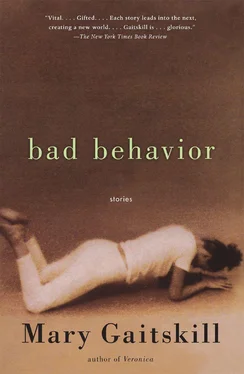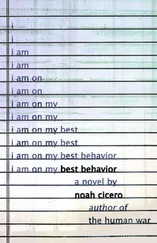That night I put my new work clothes on a chair and looked at them. A brown skirt, a beige blouse. I was attracted to the bland ugliness, but I didn’t know how long that would last. I looked at their gray shapes in the night-light and then rolled over toward the dark corner of my bed.
My family’s enthusiasm made me feel sarcastic about the job — about any effort to do anything, in fact. In light of their enthusiasm, the only intelligent course of action seemed to be immobility and rudeness. But in the morning, as I ate my poached eggs and toast, I couldn’t help but feel curious and excited. The feeling grew as I rode in the car with my mother to the receding orange building. I felt like I was accomplishing something. I wanted to do well. When we drove past the Amy Joy doughnut shop, I saw, through a wall of glass, expectant construction workers in heavy boots and jackets sitting on vinyl swivel seats, waiting for coffee and bags of doughnuts. I had sentimental thoughts about workers and the decency of unthinking toil. I was pleased to be like them, insofar as I was. I returned my mother’s smile when I got out of the car and said “thanks” when she said “good luck.”
“Well, here you are,” said the lawyer. He clapped his short, hard-packed little hands together and made a loud noise. “On time. Good morning!”
He began training me then and continued to do so all week. No interesting people came into the office. Very few people came into the office at all. The first week there were three. One was a nervous middle-aged woman who had an uneven haircut and was wearing lavender rubber children’s boots. She sat on the edge of the waiting room chair with her rubber boots together, rearranging the things in her purse. Another was a fat woman in a bright, baglike dress who had yellow in the whites of her wild little eyes, and who carried her purse like a weapon. The last was a man who sat desperately turning his head as if he wanted to disconnect it from his body. I could hear him raising his voice inside the lawyer’s office. When he left, the lawyer came out and said, “He is completely crazy,” and told me to type him a bill for five hundred dollars.
Everyone who sat in the waiting room looked random and unwelcome. They all fidgeted. The elegant old armchairs and puffy upholstered couch were themselves disoriented in the stiff modernity of the waiting room. My heavy oak desk was an idiot standing against a wall covered with beige plaster. The brooding plants before me gave the appearance of weighing a lot for plants, even though one of them was a slight, frondy thing.
I was surprised that a person like the lawyer, who seemed to be mentally organized and evenly distributed, would have such an office. But I was comfortable in it. Its jumbled nature was like a nest of available rags gathered tightly together for warmth. My first two weeks were serene. I enjoyed the dullness of days, the repetition of motions, the terms, polite interactions between the lawyer and me. I enjoyed feeling him impose his brainlessly confident sense of existence on me. He would say, “Type this letter,” and my sensibility would contract until the abstractions of achievement and production found expression in the typing of the letter. I was useful.
My mother picked me up every day. We would usually stop at the A&P before we went home to get a loaf of white French bread, beer and kielbasa sausage for my father. When we got home I would go upstairs to my room, take off my shirt and blouse, and throw them on the floor. I would get into my bed of jumbled blankets in my underwear and panty hose and listen to my father yelling at my mother until I fell asleep. I woke up when Donna pounded on my door and yelled, “Dinner!”
I would go down with her then and sit at the table. We would all watch the news on TV as we ate. My mother would have a shrunken, abstracted look on her face. My father would hunch over his plate like an animal at its dish.
After dinner, I would go upstairs and listen to records and write in my diary or play Parcheesi with Donna until it was time to get ready for bed. I’d go to sleep at night looking at the skirt and blouse I would wear the next day. I’d wake up looking at my ceramic weather poodle, which was supposed to turn pink, blue or green, depending on the weather, but had only turned gray and stayed gray. I would hear my father in the bathroom, the tumble of radio patter, the water, the clink of a glass being set down, the creak and click as he closed the medicine cabinet. Donna would be standing outside my door, waiting for him to finish, muttering “shit” or something.
Looking back on it, I don’t know why that time was such a contented one, but it was.
The first day of the third week, the lawyer came out of his office, stiffer than usual, his eyes lit up in a peculiar, stalking way. He was carrying one of my letters. He put it on my desk, right in front of me. “Look at it,” he said. I did.
“Do you see that?”
“What?” I asked.
“This letter has three typing errors in it, one of which is, I think, a spelling error.”
“I’m sorry.”
“This isn’t the first time either. There have been others that I let go because it was your first few weeks. But this can’t go on. Do you know what this makes me look like to the people who receive these letters?”
I looked at him, mortified. There had been a catastrophe hidden in the folds of my contentment for two weeks and he hadn’t even told me. It seemed unfair, although when I thought about it I could understand his reluctance, maybe even embarrassment, to draw my attention to something so stupidly unpleasant.
“Type it again.”
I did, but I was so badly shaken that I made even more mistakes. “You are wasting my time,” he said, and handed it to me once again. I typed it correctly the third time, but he sulked in his office for the rest of the day.
This kind of thing kept occurring all week. Each time, the lawyer’s irritation and disbelief mounted. In addition, I sensed something else growing in him, an intimate tendril creeping from one of his darker areas, nursed on the feeling that he had discovered something about me.
I was very depressed about the situation. When I went home in the evening I couldn’t take a nap. I lay there looking at the gray weather poodle and fantasized about having a conversation with the lawyer that would clear up everything, explain to him that I was really trying to do my best. He seemed to think that I was making the mistakes on purpose.
At the end of the week he began complaining about the way I answered the phone. “You’re like a machine,” he said. “You sound like you’re in the Twilight Zone. You don’t think when you respond to people.”
When he asked me to come into his office at the end of the day, I thought he was going to fire me. The idea was a relief, but a numbing one. I sat down and he fixed me with a look that was speculative but benign, for him. He leaned back in his chair in a comfortable way, one hand dangling sideways from his wrist. To my surprise, he began talking to me about my problems, as he saw them.
“I sense that you are a very nice but complex person, with wild mood swings that you keep hidden. You just shut up the house and act like there’s nobody home.”
“That’s true,” I said. “I do that.”
“Well, why? Why don’t you open up a little bit? It would probably help your typing.”
It was really not any of his business, I thought.
“You should try to talk more. I know I’m your employer and we have a prescribed relationship, but you should feel free to discuss your problems with me.”
The idea of discussing my problems with him was preposterous. “It’s hard to think of having that kind of discussion with you,” I said. I hesitated. “You have a strong personality and … when I encounter a personality like that, I tend to step back because I don’t know how to deal with it.”
Читать дальше












